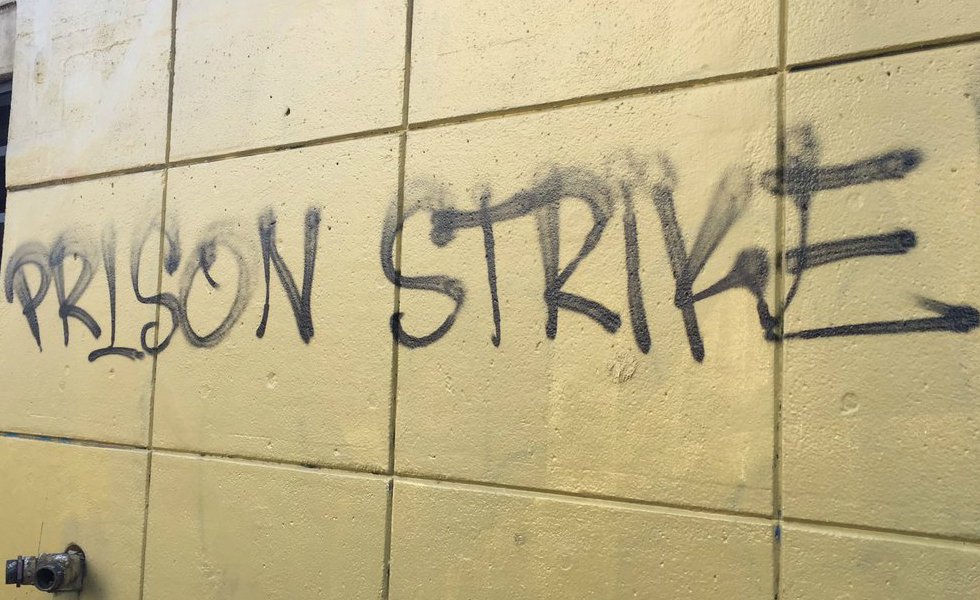Filed under: Action, Anarchist Movement, Incarceration

Call from the Incarcerated Workers Organizing Committee (IWOC) to get involved in supporting collective actions inside prisons and jails in the summer of 2022.
As 2021 comes to a close, the Incarcerated Workers Organizing Committee is collaborating closely with Jailhouse Lawyers Speak to organize collective actions inside prisons and jails from August 21 to September 9, 2022. These actions will include labor strikes, work equipment sabotage, sit-ins, boycotts and hunger strikes. The campaign, called “Shut ‘Em Down 2022,” plans to focus on locally organized actions driven by incarcerated people to meet their abilities and the demands of their specific facilities. IWOC is a branch of the Industrial Workers of the World.
“When you’re incarcerated, human rights abuses are happening left and right because the mentality is that you are there as a punishment,” says Courtney Montoya, media liaison for IWOC and Jailhouse Lawyers Speak.
Responding to a call from @JailLawSpeak, abolitionists took to the streets outside of detention centers, local jails + prisons to call for abolition, support local struggles + re-energize movements after months of repression. Our #ShutEmDown2021 roundup. https://t.co/A1sD1x8ETg pic.twitter.com/qENkOsYd6i
— It's Going Down (@IGD_News) August 25, 2021
Many incarcerated people participated in a nationwide strike wave in 2018, which serves as the model for demonstrations next year. In 2018, incarcerated organizers led hunger strikes in Missouri and Texas, labor strikes at two facilities in New York and a commissary boycott in Ohio, along with other actions. Nevertheless, neglect during the ongoing COVID-19 pandemic has highlighted the yet dismal conditions in prisons and jails across the United States, galvanizing action for 2022. Upcoming demonstrations will focus on internal organizing, differing from demonstrations this year, which involved public gatherings near prisons and jails, ICE detention centers, universities and other prominent locations to protest conditions inside facilities.
Demands related to Shut ‘Em Down 2022 vary according to local need. Many ongoing demands from previous campaigns include voting rights, access to rehabilitation programs, reinstatement of parole, closures of prisons, jails and ICE facilities, closures of all private prisons, freeing of political prisoners and an end to prison slavery. After years of demanding the 13th Amendment of the US Constitution be changed to outlaw slavery as punishment for a crime, an amendment abolishing slavery in all circumstances was proposed late last year. Should it succeed, incarcerated workers may become able to legally collectively bargain for better wages and working conditions.
On this edition of #InContempt, we roundup #RunningDowntheWalls, more #ShutEmDown2021 actions, and offer up updates on prisoner hunger strikes, political prisoners, and present an updated list of birthdays and #GeorgeFloyd rebellion defendants. https://t.co/KQVG9iIxP6
— It's Going Down (@IGD_News) October 2, 2021
Because incarcerated people’s right to organize is not protected by law, they regularly face backlash for demonstrating. Solitary confinement is a common form of punishment. Prison staff will also often attempt to interfere with communication by increasing searches and seizures of property, restricting phone calls, and censoring, tampering with or slowing down mail. Limited connection with the outside world can mean that mail is the only way for incarcerated organizers to communicate with those on the outside. When organizers face backlash, the public is often able to defend them by putting pressure on prison administrators via call-in and letter-writing campaigns.
Montoya emphasizes how tightly controlled people in prisons are. However, she is optimistic that punishment will not deter them in the long term.
“You can only do so much to a human being,” says Montoya. “I feel like the people on the inside are very much amplifying and taking all of these risks because they want to see an end to this — not just for themselves, but for people in the future.”





